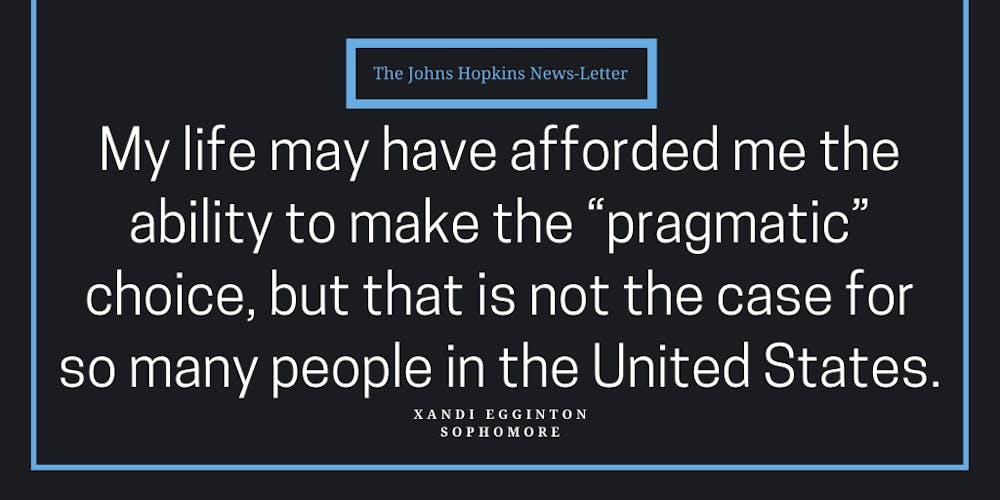Senator Bernie Sanders suspended his campaign for presidency on Wednesday, April 8, just under a week ago. Although the news seemed like it was bound to come eventually, the senator’s announcement still felt both sudden and monumental.
Widespread despair has overwhelmed radicals and progressives, while others on the left have resolved themselves to vote for former Vice President Joe Biden, the “safer choice.” Establishment centrists and their corporate endorsers, on the other hand, have been palpably relieved. My personal background and evolving political understanding of the world have afforded me insight into the logics of these divergent ideologies.
I grew up in a household where the idea of political pragmatism always won. You wouldn’t base choices in democracy on your individual whims and wishes; instead, you’d choose to endorse those who you thought had the people’s best interests at heart. You voted no matter what because the only way to navigate our political system is to participate in it.
There may be evil on all sides of the spectrum, but you always went for the lesser evil; otherwise, you were complicit in whatever the election’s outcome came to be. After all, if you didn’t cast a vote, then you didn’t choose to act in a way that — even if marginally — could have helped the vulnerable in society.
Since moving from my family home in Mount Washington, a neighborhood that lies in the outskirts of Baltimore City, to the University’s Homewood Campus two years ago, I have realized the failures and ignorance of this argument.
The reality is that in a world that is already radical in its measures of inequality and levels of corruption, the pragmatic “choice” has little weight for many people. At college, I am surrounded by friends whose lives are fractured because of policies and political realities that have existed for decades. College didn’t turn them radical; their lives did.
A couple of days ago, I woke up and scrolled through my Twitter feed. It told me that 68 percent of those who have died in Chicago due to coronavirus (COVID-19) were black, when black people make up only 30 percent of the city’s population. That is a radical and blatant sign of systemic oppression, but only one tiny example of the kind of injustices that plague communities across the nation.
The next day, I opened up my Twitter feed once again, only to see a Baltimore City police officer walking through a predominantly black community in Southeast Baltimore purposefully coughing on residents. While this officer’s actions primarily represent his individual character, they are also emblematic of recurring issues within the police force, whose job is to protect and make all citizens feel safe.
On a political level, the Republican and Democratic parties have both failed the people of this country for many years. This does not mean that every single politician has failed, but that the systems which uphold our democracy have failed.
Instead of existing as a means by which to improve and save the lives of Americans, rich and poor, these systems have acted as barriers. For a long time, the establishment cores of both parties have been riddled with moneyed interests and shameless tactics of manipulation. This is apparent at local levels, like in Baltimore City, as well as all the way at the top, in D.C.
So when friends tell me that they cannot and will not vote for Joe Biden, I support them and their decision, even though I am still unsure of what I will do with my own vote this fall. My life may have afforded me the ability to make the “pragmatic” choice, but that is not the case for so many people in the United States.
In a time that is unprecedented in all ways, we should be able to see why radical change is necessary. I hope that, in 50 years, I can tell my grandchildren that the revolution didn’t feel like a revolution, but, instead, felt like a parting from a political system that was radical in its complacency and perpetration of inequality.
I truly believed at one point that Sanders’ campaign, arguably the most revolutionary in American political history, could garner enough grassroots support to hand him the Democratic nomination. However, this fight doesn’t end with Sanders’ loss, and he will be the first to say exactly that. Because of how decentralized our federal government is, there is a lot we can do locally to implement radical change from the bottom up. In fact, I have seen signs of this radical change underway already. There is a movement in Baltimore, for one, to get big money out of our local elections by way of an Election Fund.
The point is, while every person affected negatively by the end of Sanders’ campaign should take time to heal and recuperate, the time to organize is now. Radical change awaits.
Xandi Egginton is a sophomore majoring in Political Science and Anthropology. He is currently an intern with MarylandPIRG, and he grew up in the Baltimore area.





